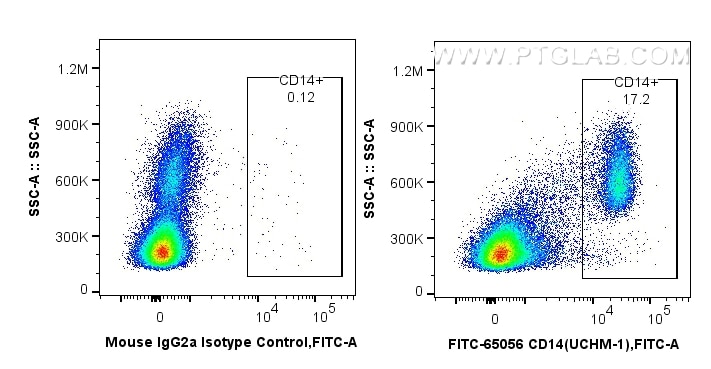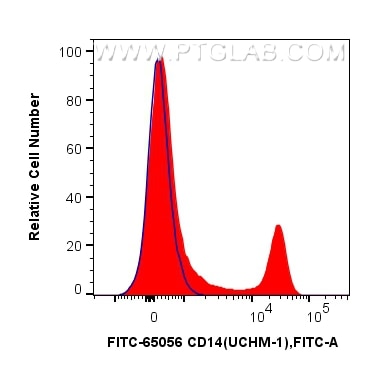Validation Data Gallery
Tested Applications
| Positive FC detected in | human PBMCs |
Recommended dilution
| Application | Dilution |
|---|---|
| Flow Cytometry (FC) | FC : 5 ul per 10^6 cells in 100 μl suspension |
| This reagent has been pre-titrated and tested for flow cytometric analysis. The suggested use of this reagent is 5 μl per 10^6 cells in a 100 µl suspension or 5 μl per 100 µl of whole blood. | |
| Sample-dependent, Check data in validation data gallery. | |
Published Applications
| FC | See 1 publications below |
Product Information
FITC-65056 targets CD14 in FC applications and shows reactivity with human samples.
| Tested Reactivity | human |
| Cited Reactivity | human |
| Host / Isotype | Mouse / IgG2a |
| Class | Monoclonal |
| Type | Antibody |
| Immunogen |
Thymocytes and peripheral blood lymphocytes from a remission AML patient 相同性解析による交差性が予測される生物種 |
| Full Name | CD14 molecule |
| Calculated molecular weight | 375 aa, 40 kDa |
| GenBank accession number | BC010507 |
| Gene Symbol | CD14 |
| Gene ID (NCBI) | 929 |
| ENSEMBL Gene ID | ENSG00000170458 |
| RRID | AB_2883746 |
| Conjugate | FITC Plus Fluorescent Dye |
| Excitation/Emission maxima wavelengths | 495 nm / 524 nm |
| Form | |
| Form | Liquid |
| Purification Method | Affinity purification |
| UNIPROT ID | P08571 |
| Storage Buffer | PBS with 0.09% sodium azide and 0.5% BSA{{ptg:BufferTemp}}7.3 |
| Storage Conditions | Store at 2-8°C. Avoid exposure to light. Stable for one year after shipment. |
Background Information
CD14 is a 50-55 kDa glycosylphosphatidylinositol-anchored glycoprotein preferentially expressed on monocytes and macrophages, and at lower levels on granulocytes (PMID: 3385210; 2462937; 7685797). CD14 can also exist as a soluble protein. CD14 acts as a co-receptor for bacterial liposaccharides (LPS) (PMID: 1698311). It plays a major role in the inflammatory response of monocytes to LPS.
Protocols
| Product Specific Protocols | |
|---|---|
| FC protocol for FITC Plus CD14 antibody FITC-65056 | Download protocol |
| Standard Protocols | |
|---|---|
| Click here to view our Standard Protocols |


